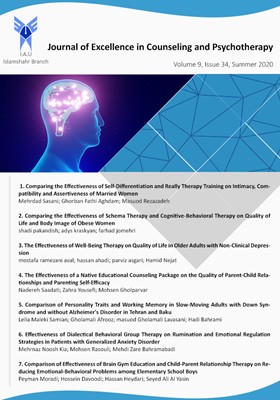Effectiveness of Dialectical Behavioral Group Therapy on Rumination and Emotional Regulation Strategies in Patients with Generalized Anxiety Disorder
Subject Areas : Journal of Excellence in Counseling and PsychotherapyMehrnaz Noosh Kia 1 , Mohsen Rasouli 2 , Mehdi Zare Bahramabadi 3
1 - Phd Student, Department of Counseling Psychology, Tehran Science and Research Branch, Islamic Azad University, Tehran, Iran
2 - Assistant prefessor٫ department of counscling kharazmi University & Science and Research Branch. Islamic Azad University٫ Tehran, Iran
3 - Institute for Research and Development in the Humanities٫ SAMT.
Keywords: cognitive emotion regulation, generalized anxiety disorder, Ruminant, dialectical behavior therapy,
Abstract :
Purpose: General anxiety disorder (GAD) is the most prevalent anxiety disorders in clinical centers and general population that mostly is chronic. Therefore, the aim of this study was to investigate the effectiveness of dialectical behavioral group therapy on rumination and emotional regulation strategies in patients with generalized aninety disorder. Methodology: This was a quasi-experimental study with a pretest and posttest design with a control group. The statistical population of the study included all adult clients with complaints about anxiety referred to one of the specialized centers of psychiatry and psychotherapy in the city of Tehran in 2019. Among them, 24 people were selected by available means and were randomly replaced in two groups. In the experimental group, dialectical behavior therapy training was performed in 10 sessions, 1 session per week and each session for 1 hour. Research instruments included the Pervasive Anxiety Disorder Scale (Spitzer et al, 2006), the Ruminant Response Scale (Knulman-Hooksma & Murrow, 1991), and the Cognitive Emotion Regulation Scale (Garnfsky et al, 2002). Data were analyzed by multivariate analysis of covariance in SPSS software version 21. Findings: The mean age in the experimental group was 39.54 and the control was 38.76 years. Based on the results of chi-square test, it was found that there is no statistically significant difference between the experimental and control groups in terms of demographic characteristics (level of education, marital status and gender) (P>0.05). The results showed that dialectical behavior therapy training is effective in reducing rumination and improving emotional regulation strategies in the experimental group (p < 0.05). Conclusion: According to the results, it is recommended that counselors and psychologists use dialectical behavior therapy along with other therapies to reduce rumination and improve emotion regulation strategies in patients with generalized anxiety disorder.
_||_


